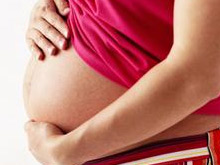Health Topics
-
Healthy Living
-
|
|
January 2010
|
| Antenatal Care |
| Dr Zehratul Quresh |
| |
 |
In India, a pregnant woman is loaded with advice and suggestions from elders. Although a lot of times old traditions and beliefs have strong ground, they may actually do harm sometimes. It is important to understand that pregnancy is a delicate process. One mistake can change the life of a newborn, its mother and the family. |
Not everybody goes through the same kind of pregnancy - each body reacts differently, and in some unfortunate situations, the pregnant mother can face a lot of complications. So to ensure good health for the baby and the mother, it is necessary to consult your obstetrician - to avoid later complications. This care taken during pregnancy is called 'antenatal care'. Ideally, the antenatal period stretches from the start of pregnancy till the birth of the baby.
Nature and Frequency of Tests
The first antenatal check-up consists of a complete physical examination. Apart from the pregnancy confirmation test, a battery of blood tests and an antenatal ultra-sound is conducted.
The frequencies of these visits are advised as follows:
1st to 7th month- once a month
8th month- twice a month
9th month- once a week
However, according to the convenience of the pregnant woman, a more flexible period is charted out. These visits are planned keeping in mind a normal pregnancy. In case of complicated situations, the doctor may suggest more frequent visits.
Diet
The calorie intake of the pregnant woman should normally increase by about 500 Kcal more than the daily intake. The increase should mainly come from protein - and to a lesser extent - from carbohydrates and fats. Refined food and sugar play little role in adding nutrition to the diet. While pregnant, the normal acceptable weight gain is around 11-12 Kg.
Personal Hygiene
Cleanliness of yourself, clothes and your surroundings will help ward off infections through the skin and respiratory tract. Washing hands before eating, after using the restroom, and a daily bath also help prevent any waterborne and food-borne infections. The genitals should be cleaned adequately with a mild antibacterial soap. The nipples should be cleaned and massaged properly as this will aid in lactation after delivery.
Bowels
Constipation may become a problem during pregnancy. This can be managed by increase in water intake and fibre in the diet. At the same time, lots of veggies and fresh fruits add bulk to the food helping in better bowel movements.
Exercise and Activities
Mild exercises such as walking are advocated during normal pregnancy. However, it is always better to check with your doctor in case of complicated pregnancies. Strenuous workouts, especially lifting weights and muscle building exercises, are better avoided. Adequate rest, relaxation and a sound sleep of at least eight hours is necessary for the mother and her baby.
Smoking
Smoking is regarded as injurious to the baby and the mother during pregnancy, as nicotine, the active ingredient of cigarettes, decreases the blood supply to the placenta - decreasing the blood supply to the baby considerably. This in turn affects the overall growth and weight of the baby. Babies of smoking mothers are observed to have lesser birth weight than babies born to non-smoking mothers. And needless to add, passive smoking mothers put their babies at risk too.
Alcohol
Drinking alcohol in moderate to heavy quantities during pregnancy may also be injurious to both the mother and the baby. It is known to cause spontaneous abortions in the first few months, and retarded growth, prematurity and low birth weight of the baby during the later months. Alcohol may also lead to foetal alcohol syndrome, which is characterised by intrauterine growth retardation (decreased growth when inside the uterus) and developmental delay - both before and after birth - manifested as delayed milestones.
Danger Symptoms
Any unusual symptoms such as swelling of the feet, convulsions, abdominal cramps, headache, palpitations, breathlessness, blurring of vision, bleeding or discharge from vagina or absence of foetal movements are considered as warning signals during pregnancy, which need to be investigated, and managed appropriately.
Genetic Counselling
Genetic screening and counselling is taken up in high risk cases, such as a couple with hereditary disorders, elderly pregnancies, teen pregnancies, pregnancy in cancer patients etc. Genetic screening is advocated in such cases in order to assess chromosomal and genetic abnormalities, developmental disorders etc.
Paternal Education and Child Care
Classes on maternal preparation for pregnancy and child care are helpful for mothers to prepare for the new comer, and to help undergo a successful pregnancy. It is essential for fathers to participate in antenatal care too. It bonds both parents towards a continued and united effort of undergoing the entire period of pregnancy amicably. |
 |
Dr. Zehratul Quersh is Clinical Pathologist at Osmania Hospital, Hyderabad |
|
|